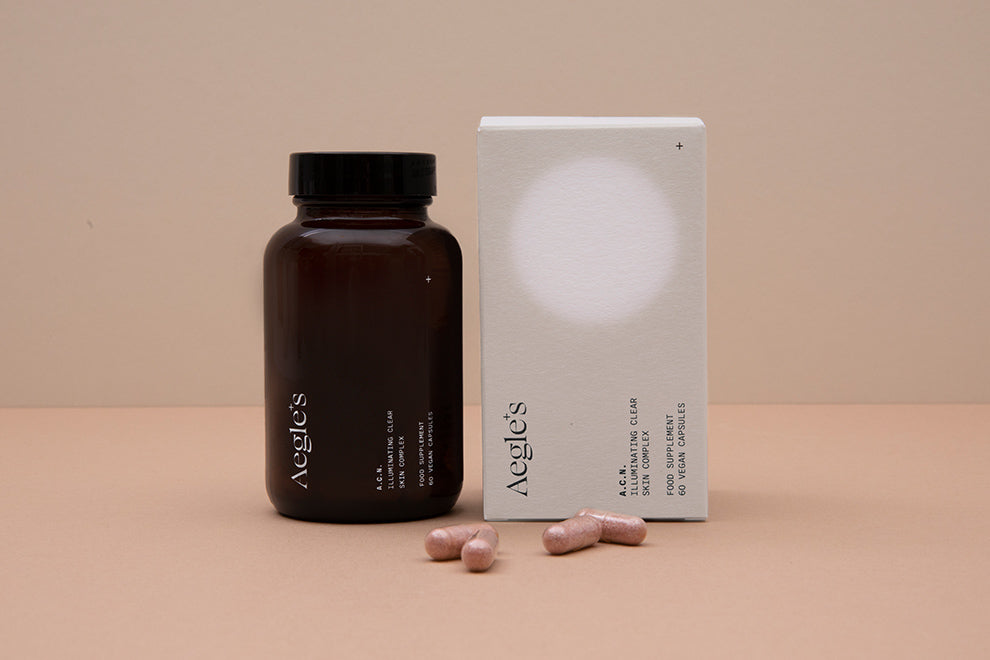

In many cases, the root cause of chronic acne is a hormonal imbalance. In women, these imbalances can be caused by lots of different factors and can affect multiple hormones. They usually occur between the ages of puberty and menopause.
Although hormone testing is not necessary in all cases, it can be a helpful tool in identifying the root cause of acne.
In this article, we’ll explore hormone testing for acne, including what it is, how it works, its potential benefits, and if it’s a good option for you.
What is hormone testing for acne?
Hormone testing for acne involves measuring the levels of various hormones in the body that can contribute to the development of blemishes. These hormones include androgens, such as dihydrotestosterone (DHT), which can stimulate the sebaceous glands in the skin to produce more sebum. When too much sebum is produced, it can clog the hair follicles and lead to the formation of blemishes.
Aside from DHT, the most commonly tested hormones for blemishes include cortisol, dehydroepiandrosterone (DHEA), testosterone, estrogen, progesterone, and luteinizing hormone (LH). Cortisol samples are sometimes collected throughout the day to monitor the daily shifts in cortisol levels.
Different types of hormone testing
Hormonal testing can be done via blood, urine, or saliva. Traditionally, hormone testing was done using blood samples. However, this method has limitations, as it's invasive and hormone levels in the blood can fluctuate throughout the day. Saliva hormone testing on the other hand is non-invasive and can be done easily and conveniently from home.
Blood testing
Blood testing is the most commonly used diagnostic tool for hormones, as it’s a highly accurate and reliable method.
However, while hormonal blood testing is highly accurate, it does have some limitations. Blood testing can be invasive and uncomfortable for some people, and it may not be suitable for those with bleeding disorders or other medical conditions that make blood collection difficult.
Blood testing also cannot be done at home, so it’s more difficult to collect samples throughout the day.
Saliva hormone testing
There are several advantages to using saliva hormone testing over blood testing. For one, saliva testing is less invasive and more comfortable. It also allows for more frequent testing, as it can be done at home without needing a medical professional. Additionally, saliva hormone testing is less subject to fluctuations due to the time of day, stress levels, or other factors that can affect hormone levels in the blood.
However, saliva hormone testing also has its limitations. For one, it may not be as accurate as blood testing in some cases. Additionally, there is limited research on the reliability of saliva hormone testing.
The process of saliva hormone testing involves collecting a saliva sample using a kit provided by the testing company. The kit usually contains a collection tube and a set of instructions. The sample is collected by spitting into the collection tube following the instructions provided, and then sending the sample to the testing company for analysis.
Dried urine testing
Dried urine testing for hormones involves collecting a urine sample and then drying it for analysis. Unlike traditional urine testing, which requires refrigeration and immediate analysis, dried urine testing allows for more convenient sample collection and storage. It also provides a more stable and accurate measure of hormone levels.
The process of dried urine testing involves collecting a urine sample, usually over a 24-hour period. The sample is then dried using specialised filter paper, which removes excess water and preserves the hormone molecules. The dried urine samples are then sent to a laboratory for analysis.
DUTCH hormone testing
DUTCH hormone testing is a type of advanced dried urine testing that provides a comprehensive analysis of hormone levels. This test measures hormone metabolites in urine, providing insights into hormone production, metabolism, and excretion. This information can be useful in identifying hormone imbalances, identifying potential underlying causes of symptoms, and developing personalised treatment plans to restore hormone balance.
DUTCH hormone testing has gained popularity in recent years due to its non-invasive nature and the level of detail it provides.
DUTCH cycle mapping
The gold standard in hormone testing for acne is DUTCH cycle mapping. This type of testing involves taking twenty-five dried urine samples throughout a full month. This gives the advantage of measuring the hormonal fluctuations in a woman’s menstrual cycle, as well as testing specific hormones on specific days in the month when the results are most useful. For example, it’s best to test progesterone levels on day 21 of a woman’s cycle, or around 5-7 days after ovulation.
The disadvantage of DUTCH cycle mapping for hormone testing is the high cost and the amount of time that it takes to collect samples.
Is hormone testing helpful for all women with acne?
The most important thing to take into account with hormone testing for acne is the results will need to be interpreted by a health professional, so this needs to be factored into the cost.
With this in mind, if you’re considering hormone testing for acne, it’s recommended to first make an appointment with a health professional that specialises in acne, to see if they have a diagnosis recommendation without needing hormone testing. This will save both time and money. In some cases, the health professional may recommend the necessity for hormone testing for a more accurate diagnosis. If this is the case, you can choose which testing you prefer based on the information in this article.
I have acne but my test results came back as normal
If you’ve had hormone testing by a medical doctor and you’ve been told that your test results are normal, ask for a copy of the results. Some medical professionals are looking for results that are very outside of a normal range, or they are not taking into consideration the low or high ends of normal, which can sometimes still cause or contribute to acne.
It may be that your results are in fact normal and your acne is caused by a non-hormonal issue (such as using pore-clogging skincare). Either way, get a copy or your results and get a second opinion from a hormone specialist or a qualified natural therapist to be sure.
Conclusion
Hormone testing can be a useful tool for identifying hormonal imbalances that may be the cause of the acne. However, hormone testing can be expensive, can take weeks for comprehensive samples to be collected, and it may not be necessary in all cases.

Start your journey to heal your skin now.
- Contains ingredients clinically proven to improve blemishes and skin radiance.
- Formulated by one of the world's leading skin practitioners.
- The only supplement that works for the three main causes of blemishes, blackheads and oily skin.






